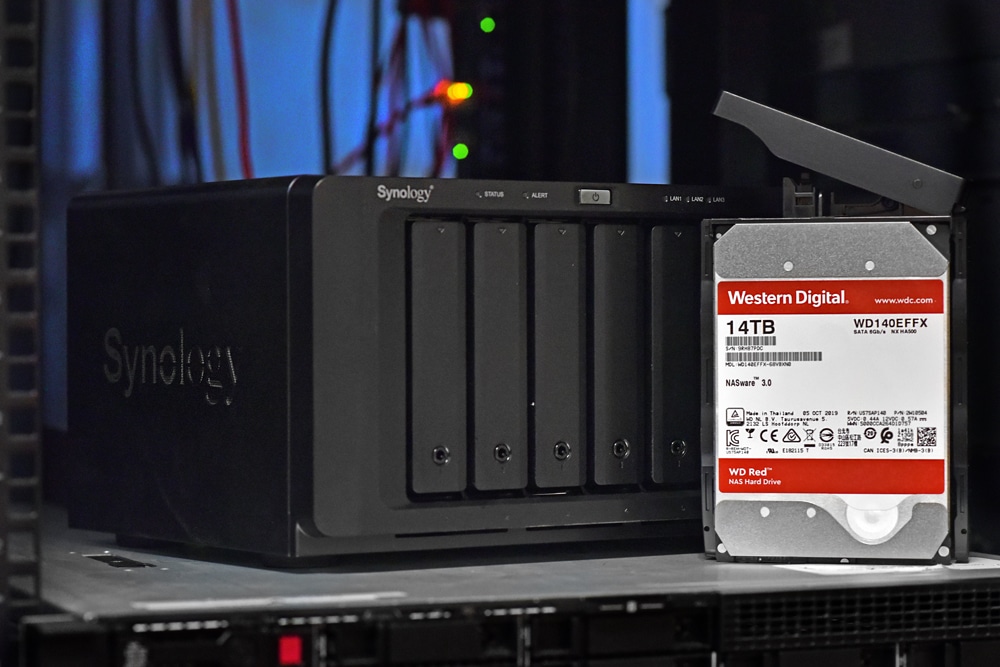The Synology DiskStation DS1621xs+ was launched in mid-September of this year as an update to Synology’s line of high-end business NAS in a desktop form factor. The DS1621xs+ offers six 3.5″ drive bays, though it is expandable to 16 total bays via two 5-bay DX517 JBODs.
The Synology DiskStation DS1621xs+ was launched in mid-September of this year as an update to Synology’s line of high-end business NAS in a desktop form factor. The DS1621xs+ offers six 3.5″ drive bays, though it is expandable to 16 total bays via two 5-bay DX517 JBODs.
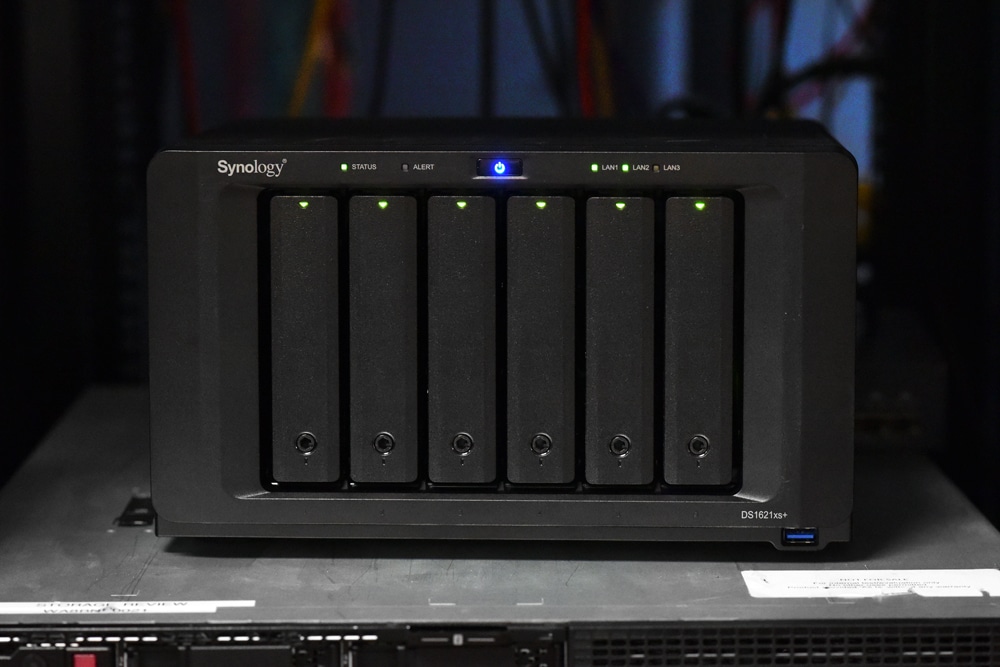
Under the covers resides an Intel Xeon D-1527 4-core 2.2 GHz CPU, 8GB DDR4 ECC SODIMM (expandable up to 32GB), and dual M.2 2280 NVMe SSD bays for caching. Turning to connectivity, the DS1621xs+ offers a few ports onboard, including twin GbE ports and a single 10GbE RJ-45 port. Should an organization need even more, this NAS offers a PCIe expansion slot as well which can be used for additional SSD slots, networking, or with the Synology combo card, both.
While the DS1621xs+ uses DiskStation Manager (DSM) for its operating environment (on top of the Btrfs file system), the horsepower within this build makes some of the advanced features more scalable for multi-tenant environments. Synology sees this NAS as a perfect solution for businesses that want to take advantage of Synology’s suite of cloud, collaboration, and virtualization services.
The Synology DS1621xs+ comes with a 5-year warranty and has an MSRP of $1599.99, though it’s roughly $1550 bare at the time of this review.
Synology DS1621xs+ Specifications
| CPU | Intel Xeon D-1527 4-core 2.2GHz, Turbo Boost up to 2.7GHz |
| Hardware encryption engine | Yes (AES-NI) |
| Memory | 8 GB DDR4 ECC SODIMM (expandable up to 32 GB) |
| Compatible drive type | 6 x 3.5″ or 2.5″ SATA HDD/SSD (drives not included) 2 x M.2 2280 NVMe SSD (drives not included) |
| Hot-swappable drive | Yes |
| External port | 3 x USB 3.0 port 2 x eSATA port |
| Size (HxWxD) | 166 x 282 x 243 mm |
| Weight | 5.3 kg |
| LAN | 2 x 1GbE RJ-45 1 x 10GbE RJ-45 |
| Wake on LAN/WAN | Yes |
| PCIe 3.0 slot | 1 x 8-lane x8 slot High-performance network interface card support |
| Scheduled power on/off | Yes |
| System fan | 2 (92 x 92 x 25 mm) |
| AC input power voltage | 100 V to 240 V AC |
| Power frequency | 50/60 Hz, single phase |
| Operating temperature | 0°C to 40°C (32°F to 104°F) |
| Storage temperature | -20°C to 60°C (-5°F to 140°F) |
| Relative humidity | 5% to 95% RH |
| Maximum operating altitude | 5,000 m (16,400 ft) |
Synology DS1621xs+ Design and Build
The Synology DiskStation DS1621xs+ looks like the rest of the company’s tower form factor NAS devices. The chassis is matte black and made of metal and plastic. Across the front are the 3.5” drive bays that include the ability to lock and a drive status indicator LED at the top. The top of the device from left to right has a status indicator, alert indicator, power button, and the LAN indicator lights. There is a USB 3.0 port in the bottom corner as well.
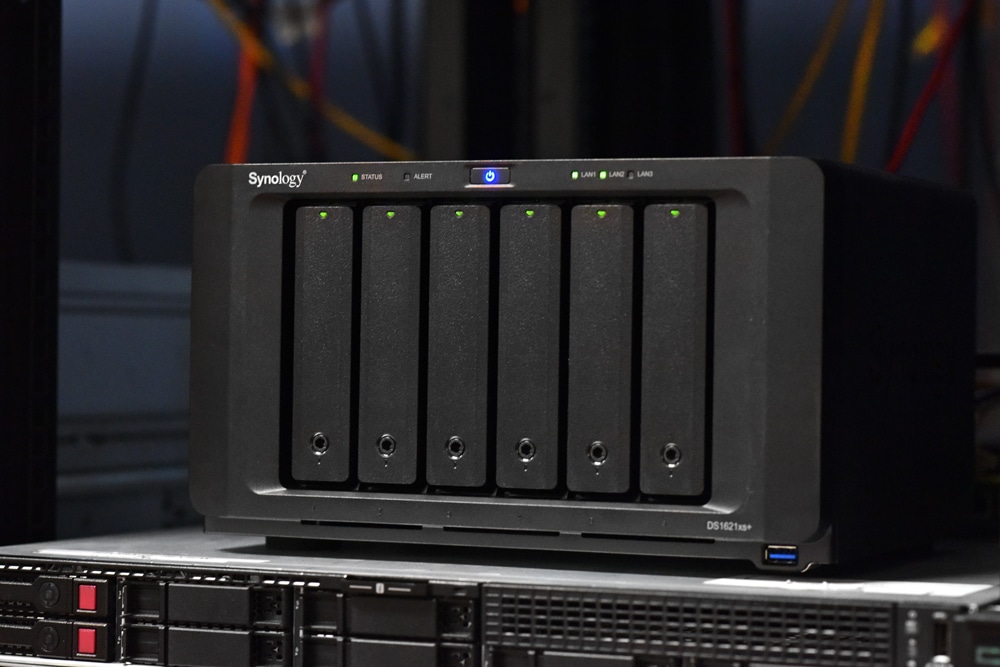
Flipping the NAS around to the rear we see the fans that take up a bulk of the real estate. To the left, is the power port and the Kensington security slot. To the right, is the PCIe expansions slot. Across the bottom, from left to right, are two USB 3.0 ports, a 10GbE RJ-45 port, two 1GbE RJ-45 ports, a reset button, and two expansion ports.
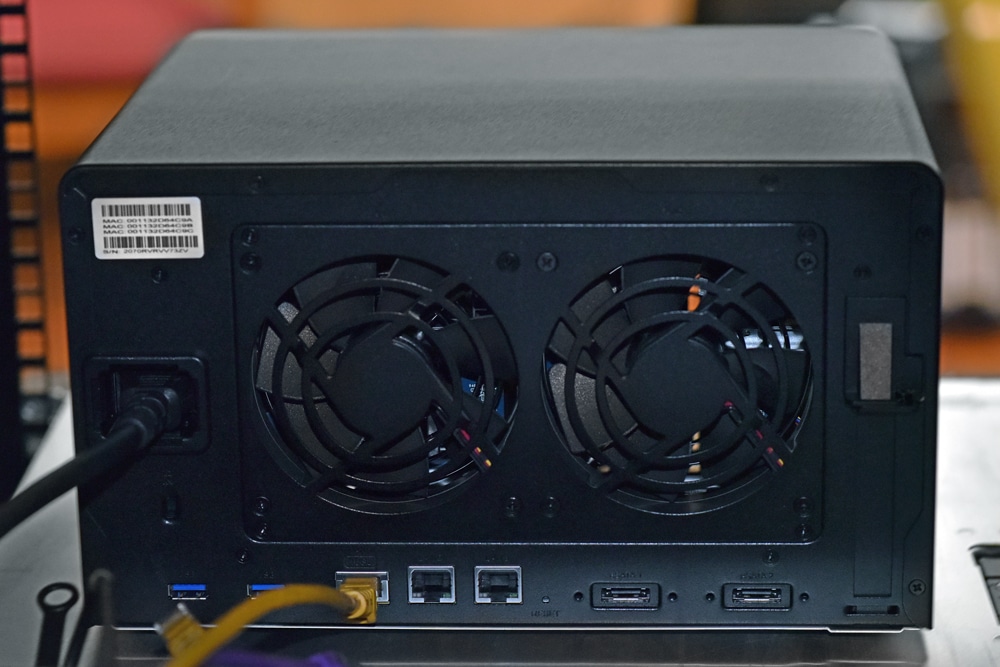
The M.2 cache is in a bit of a different spot, being on the inside of the device on the left side of the furthermost drive bay.
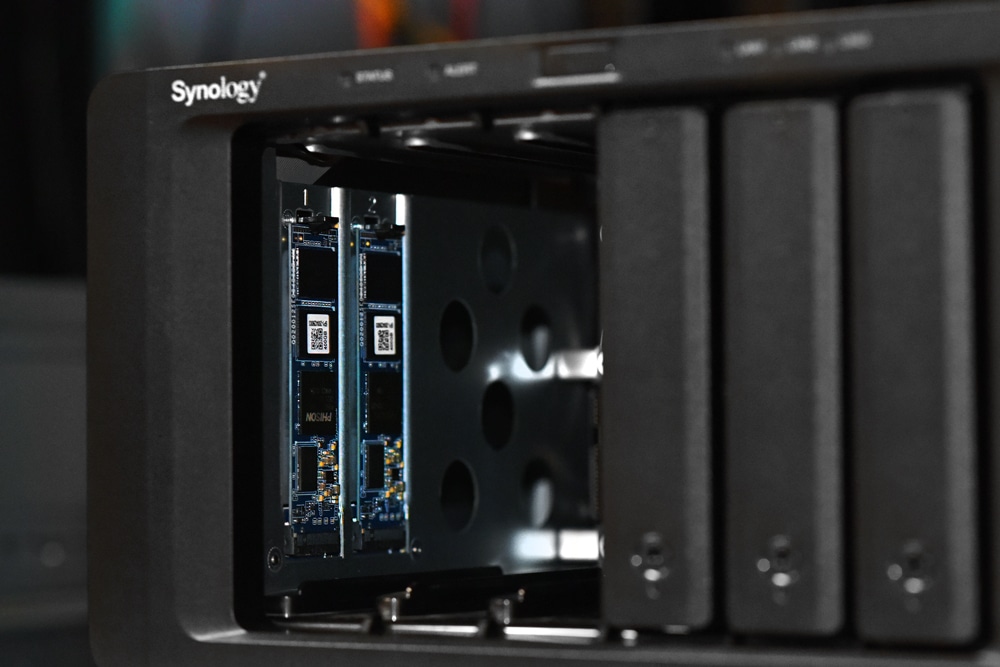
Synology DS1621xs+ Performance
For our testing, we configured the Synology DiskStation in RAID6 in both iSCSI and SMB. We ran each test with the SSD cache off and on. For HDD we used WD Red 14TB and for the SSD cache, we used two Synology SNV3400-400G SSD. This is not a comparison of the SSD cache on or off – the SSD cache will provide better performance. This reflects what to expect if users choose to leverage it or not.
Enterprise Synthetic Workload Analysis
Our enterprise shared storage and hard drive benchmark process preconditions each drive into steady-state with the same workload the device will be tested with under a heavy load of 16 threads with an outstanding queue of 16 per thread, and then tested in set intervals in multiple thread/queue depth profiles to show performance under light and heavy usage. Since hard drives reach their rated performance level very quickly, we only graph out the main sections of each test.
Preconditioning and Primary Steady-State Tests:
- Throughput (Read+Write IOPS Aggregate)
- Average Latency (Read+Write Latency Averaged Together)
- Max Latency (Peak Read or Write Latency)
- Latency Standard Deviation (Read+Write Standard Deviation Averaged Together)
Our Enterprise Synthetic Workload Analysis includes four profiles based on real-world tasks. These profiles have been developed to make it easier to compare to our past benchmarks as well as widely-published values such as max 4k read and write speed and 8k 70/30, which is commonly used for enterprise drives.
- 4K
-
- 100% Read or 100% Write
- 100% 4K
- 8K 70/30
- 70% Read, 30% Write
- 100% 8K
- 8K (Sequential)
- 100% Read or 100% Write
- 100% 8K
- 128K (Sequential)
- 100% Read or 100% Write
- 100% 128K
In the first of our enterprise workloads, we measured a long sample of random 4K performance with 100% write and 100% read activity. Looking at IOPS, the Synology DiskStation DS1621xs+ was able to hit 4,540 IOPS read and 1,880 IOPS write in iSCSI and 179 IOPS read and 1,940 IOPS write in SMB. Turning the cache on we saw the numbers jump to 98,504 IOPS read and 67,453 IOPS write in iSCSI and SMB gave us 3,425 IOPS read and 22,537 IOPS write.
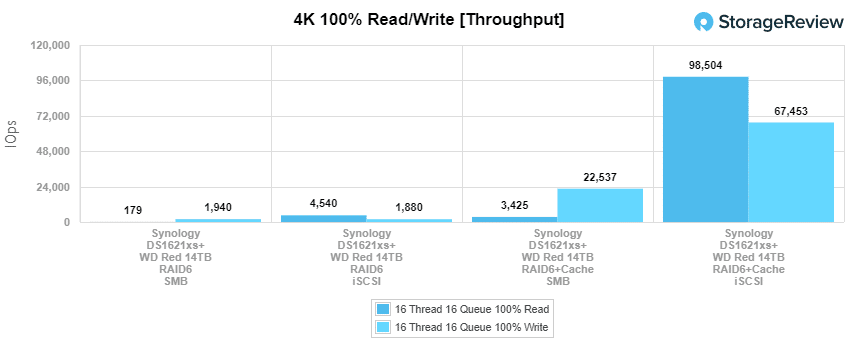
For 4K average latency the DS1621xs+ gave us iSCSI scores of 56.38ms read and 136.15ms write and SMB speeds of 1,426.81ms read and 131.9ms write. With the cache, the numbers dropped to 2.6ms read and 3.8ms write for iSCSI and 74.7ms read and 11.4ms write for SMB.
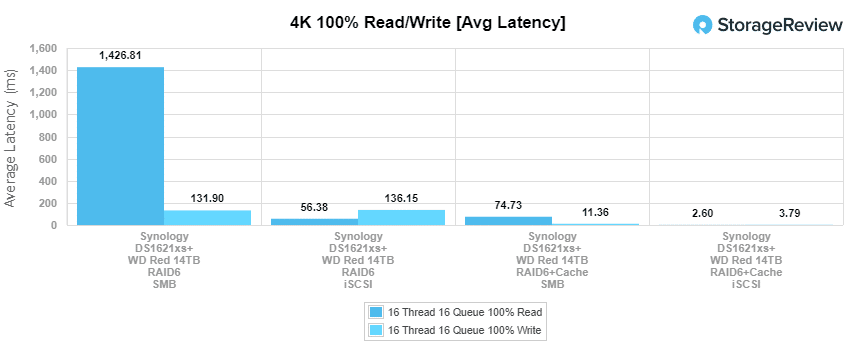
With 4K max latency, the Synology saw 1,161.9ms read and 3,901.2ms write for iSCSI and SMB hit 2,729ms read and 3,259ms write. The cache feature brought the numbers down to 848.7ms read and 342.8ms write for iSCSI and 943ms read and 38ms write for SMB.
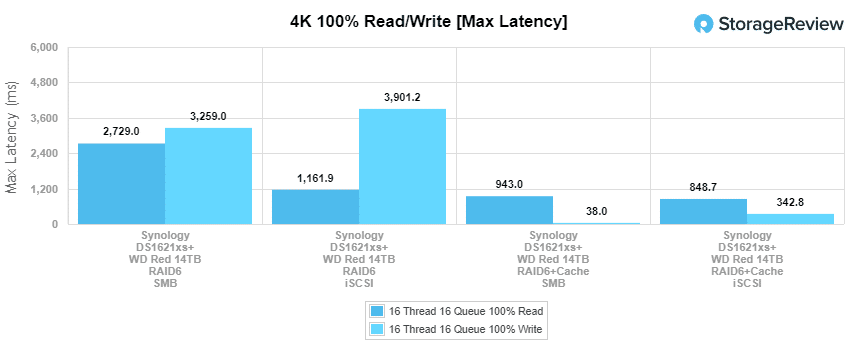
4K Standard deviation showed that the NAS was able to hit 61.8ms read and 210.3ms write in iSCSI and 110.9ms read and 223.5ms write in SMB. Once the cached was engaged, we saw 5.5ms read and 7.2ms write for iSCSI and 65.9ms read and 1.3ms write for SMB.
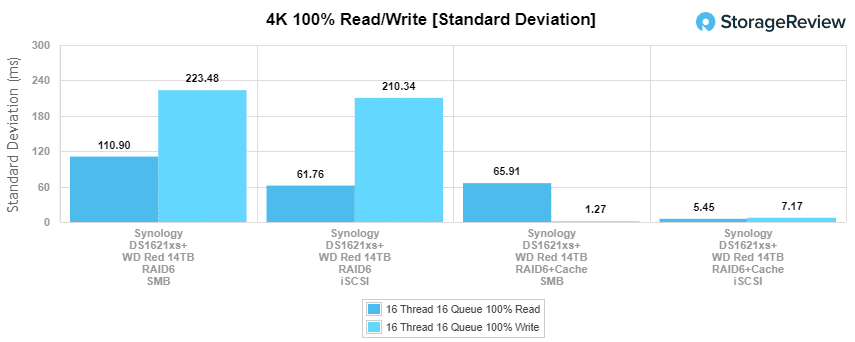
Our next benchmark measures 100% 8K sequential throughput with a 16T16Q load in 100% read and 100% write operations. Here, the Synology DiskStation DS1621xs+ was able to hit 99,226 IOPS read and 50,460 IOPS write for iSCSI and 46,162 IOPS read and 27,612 IOPS write for SMB. Leveraging the cache, we saw a slight bump in performance up to 99,811 IOPS read and 61,015 IOPS write for iSCSI. For SMB we saw 37,166 IOPS read and 23,134 IOPS write, a decrease in both cases.
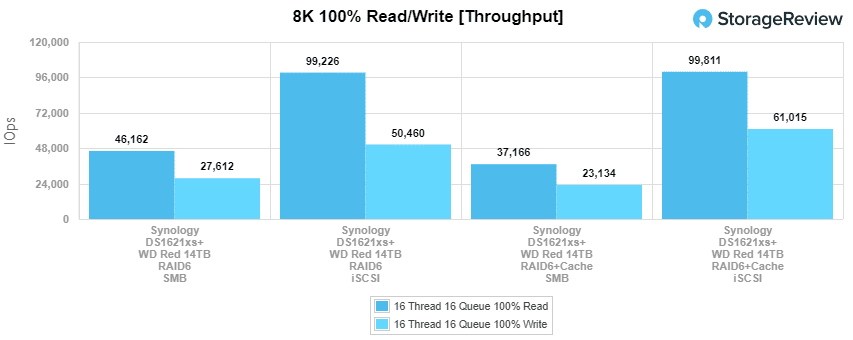
Compared to the fixed 16 thread, 16 queue max workload we performed in the 100% 4K write test, our mixed workload profiles scale the performance across a wide range of thread/queue combinations. In these tests, we span workload intensity from 2 thread/2 queue up to 16 thread/16 queue. In throughput, we saw iSCSI run from 718 IOPS to 2,461 IOPS and SMB run from 231 IOPS to 235 IOPS. With the cache on, iSCSI went from as low as 10,293 IOPS up to a high of 55,677 IOPS and SMB ran other steady-ish line starting on a high of 2,509 IOPS and finishing rather low with 1,286 IOPS.
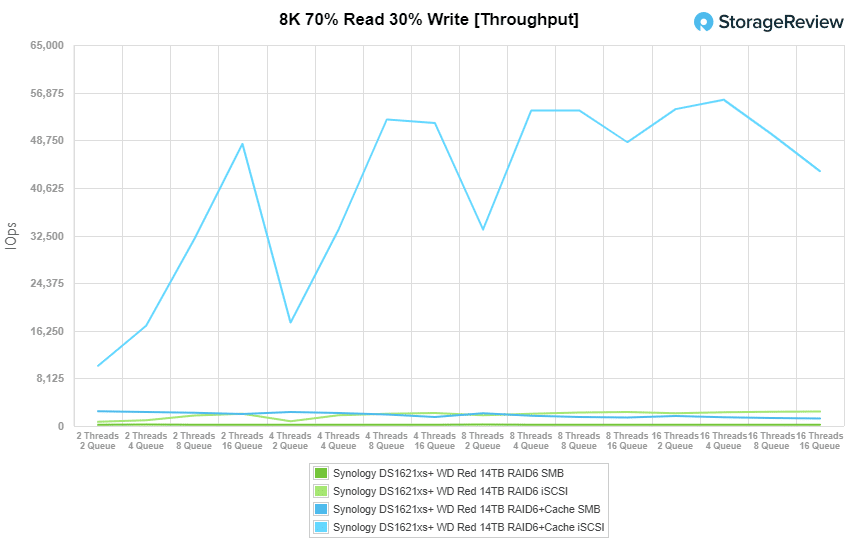
For 8K 70/30 average latency, we saw iSCSI range from 5.56ms to 104ms while SMB ranged from 17.05ms to 1,093ms. Once the cache was on the iSCSI dropped to a range of 380µs to 5.88ms. SMB improved quite a bit to a range of 1.59ms to a max of 198.9ms.
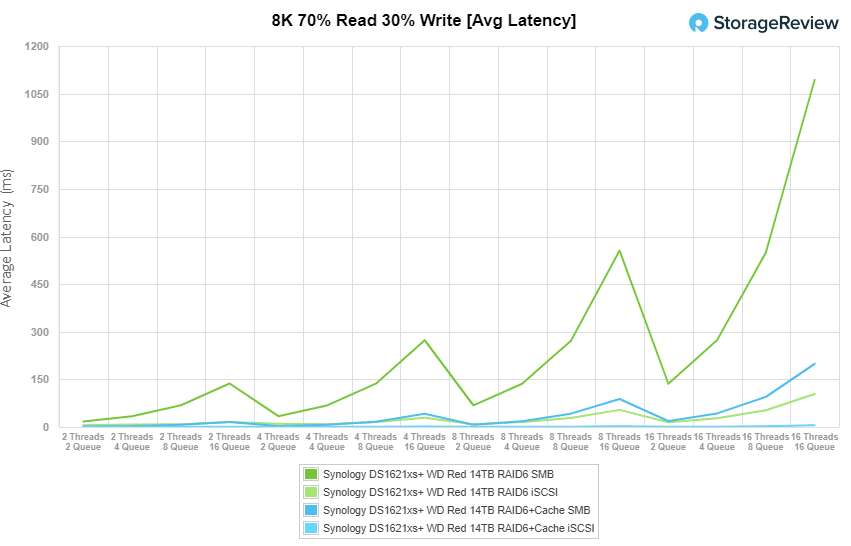
8K 70/30 max latency iSCSI performance ranged from 994ms to 5,541ms and SMB saw 1,085ms to 3,826ms. Turning the cache on the numbers in iSCSI started off better and saw a low of 29.6ms but finished much higher at 9,551ms. The SMB with cache on saw a low of 702.5ms and a high of only 1,560.5ms.
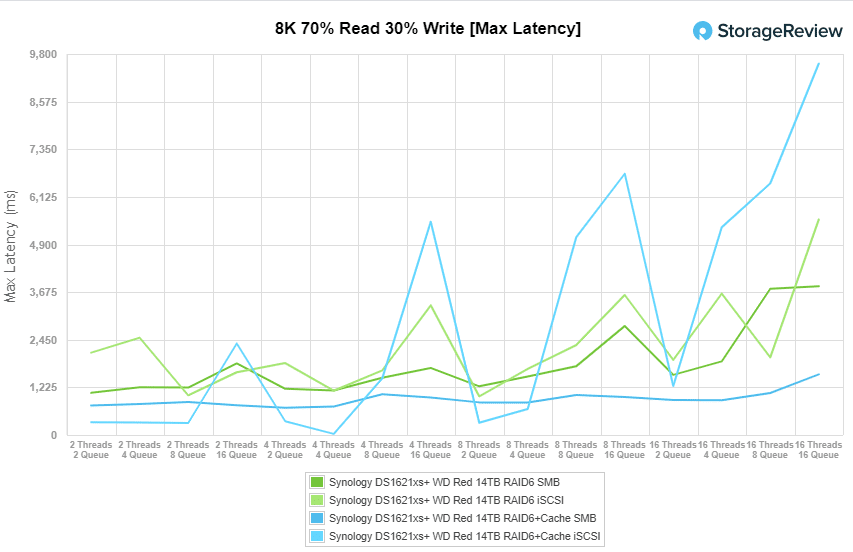
For 8K 70/30 standard deviation, the iSCSI configuration ranged from 24.6ms to 258.4ms and the SMB range from 29.1ms to 427.3ms. The cache again saw an improvement with the iSCSI ranging from 520µs to 89.6ms and the SMB ranging from 12.4ms to 156.9ms.
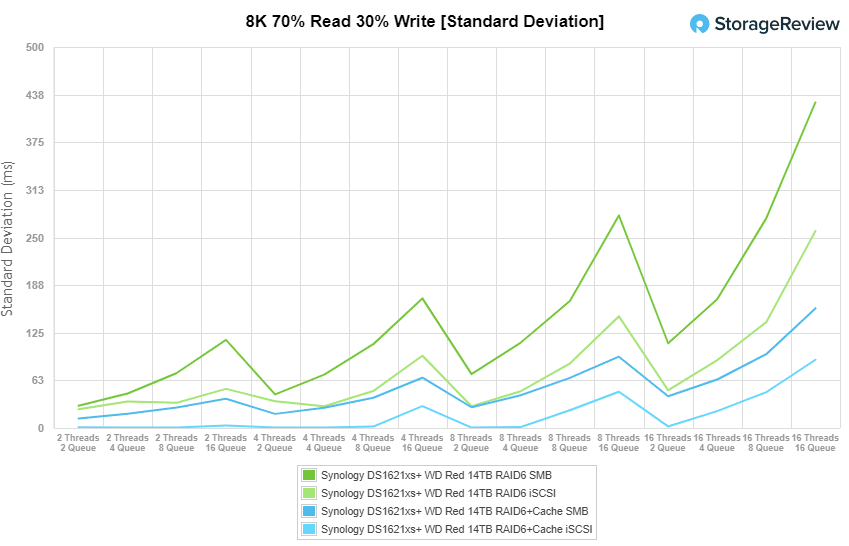
The last Enterprise Synthetic Workload benchmark is our 128K test, which is a large-block sequential test that shows the highest sequential transfer speed for a device. In this workload scenario, the DS1621xs+ was able to hit 1.15GB/s read and 937MB/s write in iSCSI and 1.16GB/s read and 930MB/s write in SMB. Turning on the cache saw the iSCSI read hold steady at 1.15GB/s and the writes drop to 898MB/s. SMB saw a bigger drop with read dropping all the way to 388MB/s and write dropping to 318MB/s.
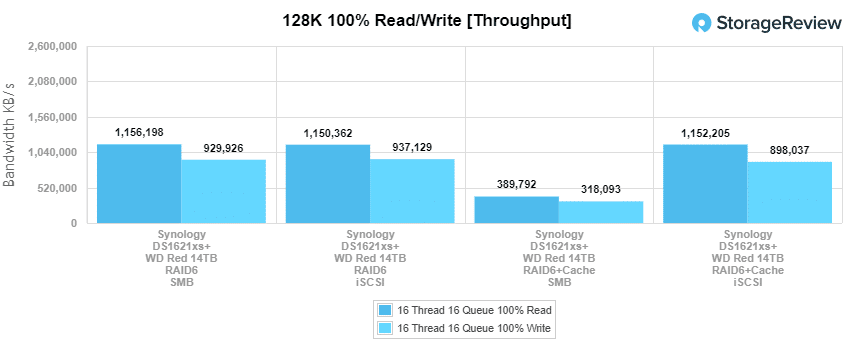
Conclusion
The Synology DiskStation DS1621xs+ is a high-performance 6-bay NAS designed to meet the needs of small businesses and other organizations that expect to have several users hitting the NAS at once. The NAS can be expanded up to 16 drives with two 5-bay expansion units. Other hardware features include an Intel Xeon D-1527 4-core 2.2 GHz CPU, up to 32GB DDR4 ECC SODIMM (though coming with 8GB), dual M.2 2280 NVMe SSD bays for caching, and an onboard 10GbE port. Combine this with the user-friendly DSM operating system, and users have a pretty powerful device.
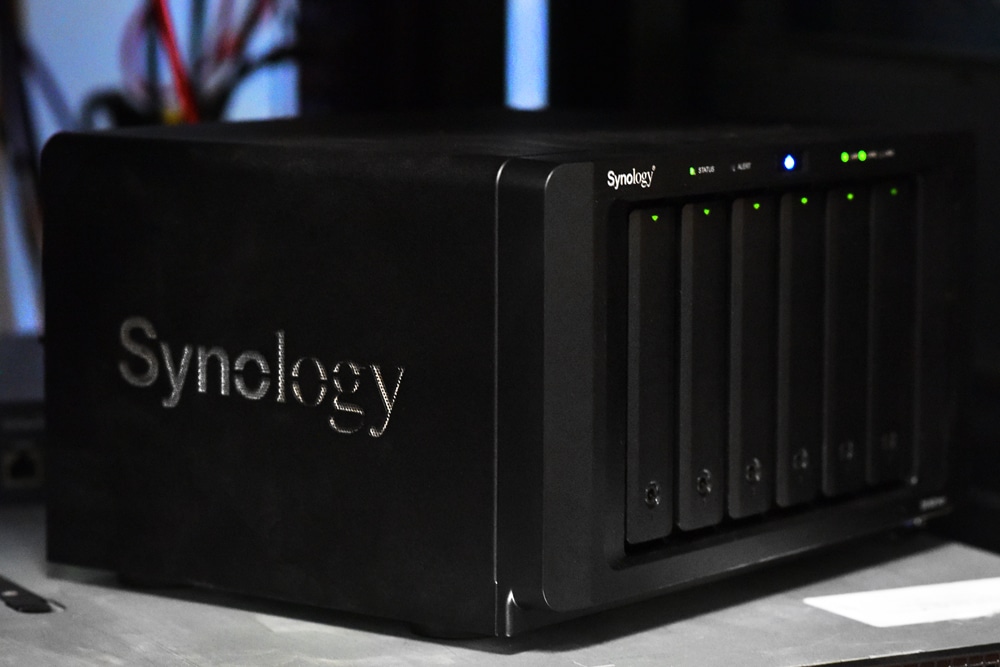
For performance, we looked at HDD performance with our WD Red 14TB drives, as well as SSD cache-enabled performance leveraging our two Synology SNV3400-400G NVMe SSDs. During our 100% read/write random 4K test, the DS1621xs+ in iSCSI configuration was able to hit 4,540 IOPS read and 1,880 IOPS write with average latencies of 56.38ms read and 136.15ms write. 8K sequential saw iSCSI performance of 99,226 IOPS read and 50,460 IOPS write. 128K Large Block for iSCSI was 1.15GB/s read and 937MB/s write. Turning the cache on saw the results mainly go up with 4K hitting 98,504 IOPS read and 67,453 IOPS write with average latency of 2.6ms read and 3.8ms write. For 8K sequential the numbers jumped to 99,811 IOPS read and 61,015 IOPS write. And in 128K the NAS hit 1.15GB/s and the write drop to 898MB/s.
With SMB the results were a bit more subdued. In 4K we saw 179 IOPS read and 1,940 IOPS write with average latency being 1,426.81ms read and 131.9ms write. For 8K sequential the configuration hit 46,162 IOPS read and 27,612 IOPS write. In 128K large-block SMB had speeds of 1.16GB/s read and 930MB/s write. Turning the cache on saw improvements in certain tests. 4K went to 3,425 IOPS read and 22,537 IOPS write with average latency of 74.7ms read and 11.4ms write. 8K sequential went down to 37,166 IOPS read and 23,134 IOPS write. 128K saw another drop down to 388MB/s read and 318MB/s write.
Synology adds yet another solid release with the DiskStation DS1621xs+. Aimed at the smaller businesses with the room to grow, the DS1621xs+, outfitted with SSD cache, should be able to meet all their NAS needs.
Synology DiskStation DS1621xs+ at Amazon
Engage with StorageReview
Newsletter | YouTube | Podcast iTunes/Spotify | Instagram | Twitter | Facebook | RSS Feed

